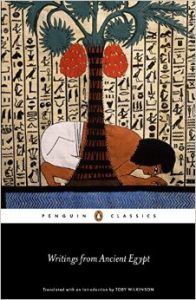New Egyptian Translations Spark Renewed Love of Egypt
Christina Bagni//Blog Writer
It’s practically a rite of passage for kids to go through an “Ancient Egypt” phase. Mine lasted from fifth grade through all of middle school, during which I wrote half-researched stories about Ra and Set and wore thick winged eyeliner I thought looked like kohl. Egypt fascinated me, and probably you too—there’s something so enchanting and mysterious about the giant monuments, the intricate mythology, and the advanced technology.
Lucky for those of us with ankhs and eyes of Horus drawn in the margins of our elementary school notebooks, Egyptology is about to make a comeback. Penguin Classics released Writings From Ancient Egypt this January, a collection of Ancient Egyptian texts translated into English and released to the general public for the first time. Translated by Egyptologist Toby Wilkinson, the collection spans from as early as 2350 B.C. through to 323 B.C., the time of Alexander the Great.

Wilkinson writes in the introduction that while we know plenty “about” Egypt, we do not know much about its writers, as opposed to ancient Greek and Roman writers who are household names (Socrates, Euripides, Plato). In fact, Egyptian written language is often thought of only as the hieroglyphics within pyramids, but there is more to these symbols than simply serving as wallpaper. Wilkinson’s translations aim to serve the every-day reader, the casual Egypt-enthusiast, instead of only scholars. For this reason, each translation is accompanied by his professional explanation of the context behind the texts.
The texts themselves are organized into eleven sections: autobiographical inscriptions, battle narratives, hymns, lamentations, legal texts, letters, mortuary texts, royal inscriptions, songs, tales, and teachings, each which try to, as Wilkinson describes, “shed light on the lives and beliefs of ordinary people, not just the preoccupations of the king and his immediate circle.”
One example from the “Legal texts” section is a new law put in order that anyone who steals a boat shall have their nose cut off. One “teaching” gives advice on how to deal with argumentative speakers with respect, to “kill them with kindness” as we say today. One “song” praises life and urges people to enjoy it while it lasts; one “lamentation” is a highly metaphorical letter a man wrote to his own grieving heart, and one “tale” is an amusing story of a wizard lifting half a river to retrieve his wife’s lost necklace. The stories, once translated out of their veil of mysticism, allow us to see the ancient Egyptians not just as incredible pieces of history, but as people, with lives beyond that which we have romanticized.
Though parts of the book are a bit slow (the entire chapter on various laws, for example), I highly recommend this new release for anyone who has or once had an interest in ancient Egypt or other ancient cultures. It is a great way to see the culture through its own words, and Wilkinson’s contextual introductions can help even the most out-of-practice fall back in love with Egypt.
